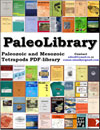
Complete Data Base of Paleozoic and Mesozoic Tetrapods.
Paleo-News and illustrations. Big electronic PDF-library.
| |
| PaleoNews |
| Classification |
| Books and Articles |
| Contact |
| Forum |
сайт о динозаврах
рейтинг сайтов
Free Counter
myspace hit counter
What the Demise of the Dinosaurs Has in Common with JFK's Assassination |
April 30, 2016 By Stephen Brusatte There's a prime suspect in both cases, but was there a second gunman on the grassy knoll? Why did the dinosaurs go extinct? For paleontologists, this riddle is our equivalent of the JFK assassination. In both cases there is a clear culprit (asteroid for the dinosaurs, Oswald for JFK), but that doesn’t stop the nagging doubt that something else may have been at play. The parallels can be fun to consider, so hear me out. Was there another gunman who shot the President? Or the similar question for dinosaurs: perhaps the asteroid impact is wrongly blamed for their death. Perhaps it was extensive volcanism, environmental changes, gradual out-competition from mammals, or something else that was the real killer? Was JFK the victim of a sordid conspiracy, and Oswald was simply the trigger man? Maybe nature conspired against the dinosaurs: perhaps the asteroid was the final straw for a group that was already beaten down and wasting away to extinction by other means. Like the investigators who pieced together what happened in Dallas in 1963, we paleontologists are detectives who use a variety of techniques and evidence to solve mysteries—mysteries in deep time. This probably explains one of my guilty pleasures: watching true crime tabloid shows on television, much to my wife’s annoyance. This week, two new studies have been published, which use different analyses and datasets to reach strikingly different conclusions for why the dinosaurs died. The first, published in Proceedings of the National Academy of Sciences, uses big family trees of dinosaurs to assess how they were evolving over the course of their 150+ million year history on Earth. The result: dinosaurs were producing fewer species and going extinct at higher background rates for many tens of millions of years before the six-mile-wide Chicxulub asteroid hit at the end of the Cretaceous, 66 million years ago. The authors of the study—a crack team of statistics-obsessed researchers led by my buddy Manabu Sakamoto from the University of Reading—seemed surprise by what they found. Their study indicates that dinosaurs were in a long-term decline, for reasons unclear. In their interpretation, the asteroid finished off the sad remnants of a once-proud dynasty, who probably would have eventually succumbed to gradual extinction even if the space rock didn’t fall from the sky. But a second study, published in Current Biology, tells a much different story. A team led by another dynamic young paleontologist, Derek Larson of the University of Toronto, looked at how one important type of dinosaur—small meat-eaters like Velociraptor—were changing over the final 18 million years before the asteroid hit. Larson and his team, while also very good statisticians, are obsessive field paleontologists. Their study synthesized evidence from over 3000 fossil specimens pried from the badlands of western North America, the best place in the world for preserving fossils of those very last-surviving dinosaurs. Larson’s team found no evidence for a decline. Instead, they found that the small meat-eaters were hugely diverse during the last stanza of the Cretaceous, exploiting a wide range of niches and diets. Not only that, but there was no gradual diversity decrease leading up to the asteroid impact. Instead, these dinosaurs were thriving, and then, bam!, one day their world changed forever and within a few tens of thousands of years they were gone, replaced by our plucky mammalian ancestors. These results are more in line with the consensus view: the asteroid did it, and did it quickly. This is the view that I have argued for, in a paper I published last year in Biological Reviews with an international team of dinosaur experts. We used big databases of all dinosaur occurrences over time and applied a variety of statistical analyses, finding no evidence for any long-term decline but plenty of evidence for a sudden extinction right at that moment the asteroid did its thing. This is the story that I told in a Scientific American article in December 2015. So what gives? How can different studies report such widely different results? Right now I don’t know. But it sure is fun to try to figure it out, which is why Manabu, Derek, and I, and many other paleontologists, have been abuzz on Twitter this week. This is science at its best—big mysteries, various clues and techniques being brought to the table, invigorating and always respectful debate among paleontologists. And there is surely more to come. Because just as my, ahem, iconoclastic uncle always seems to have another theory on the JFK shooting, paleontologists will continue to argue about why the dinosaurs are here no more. http://blogs.scientificamerican.com/guest-blog/what-the-demise-of-the-dinosaurs-has-in-common-with-jfk-s-assassination/
|
